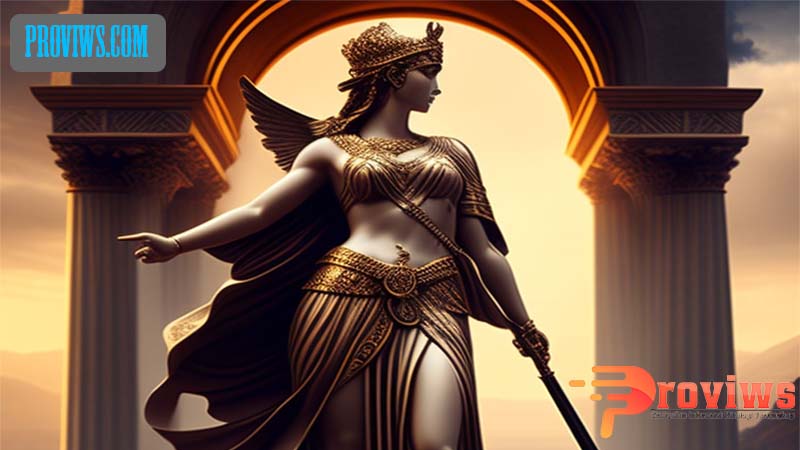The Goddess Athena is one of the most prominent figures in ancient Greek mythology. She is the goddess of wisdom, strategy, art, and war, and is also known as the protector of the city of Athens. This goddess played a crucial role in shaping the character and culture of ancient Greece.
Life and Birth The Goddess Athena
In Greek mythology, Athena is the daughter of Zeus, the king of the gods, and Metis, the goddess of wisdom. Legend has it that Zeus swallowed Metis when she was pregnant with Athena, and Athena was miraculously born from Zeus’s head. This myth is fascinating because it portrays Athena as a goddess born from thought and wisdom rather than a conventional birth process. She emerged from her father’s head fully clothed in armor and carrying weapons, including a shield and spear.
Role The Goddess Athena in Mythology
Athena played a significant role in many Greek myths. One of her notable appearances is in Homer’s epic, the “Iliad,” where she assists Greek warriors during the Trojan War. Athena is also known as the protector of heroes such as Odysseus and Heracles, providing them with guidance and support in their adventures.
She is also revered as the guardian of Athens, a city named after her. Athens served as the cultural and intellectual hub of ancient Greece. The Parthenon, built in her honor on the Acropolis of Athens, stands as a classic example of Greek architecture and a significant testament to the grandeur of ancient Greek civilization.
The Goddess Athena as a Symbol of Wisdom
Athena is the embodiment of wisdom in Greek mythology. She is often depicted in Greek art with attributes that signify intelligence and deep thought. The helmet she wears symbolizes courage and protection, while her shield and spear represent combat skills and military strategy.
Furthermore, Athena is closely associated with the arts and literature. She is the patron of artists and writers, inspiring them to create beautiful and meaningful works. Under her patronage, Greek art and culture flourished.
The Parthenon Temple
One of the greatest architectural achievements in history is the Parthenon Temple, dedicated to Athena Parthenos, the virgin goddess. This temple was constructed on the Acropolis of Athens in the 5th century BC and stands as an iconic masterpiece of classical architecture. The renowned sculptor Phidias was responsible for the statue of Athena inside the temple, known as Athena Parthenos.
The Parthenon Temple not only served as a place of worship but also as a center for cultural and political activities in Athens. It was the primary meeting place for Athenian citizens and hosted various cultural events, including festivals, theater performances, and political gatherings. The temple symbolizes the pride and identity of the city of Athens.
The Goddess Athena cursed Medusa
The most well-known version of this story is that Medusa was originally a beautiful priestess of Athena who was transformed into a Gorgon as a punishment. According to some variations of the myth, Medusa was cursed by Athena after she desecrated Athena’s temple by having a romantic encounter with Poseidon within its sacred walls. In response to this violation of her temple’s sanctity, Athena turned Medusa into a hideous creature.
While Athena played a role in the transformation, it’s important to note that the curse itself was not explicitly described as a curse cast by Athena but rather a consequence of Medusa’s actions within the context of the myth. Athena’s involvement in the story serves to illustrate the consequences of violating sacred spaces rather than a direct act of cursing.
Connection to Valor and War
Despite being the goddess of wisdom, Athena also possesses aspects related to war and valor. She is often depicted with her shield and spear, symbolizing her prowess in battle. Athena assisted Greek heroes in facing various challenges and dangers in mythology, providing them with courage and military strategy.
One of the most famous stories involving Athena is the Trojan War. She offered guidance to Greek warriors like Achilles and Odysseus during the war against Troy. She also aided in constructing the massive walls that surrounded the city. Known as the Walls of Athena, to protect the Greek forces.
Athena’s Legacy in Popular Culture
Athena continues to be present in contemporary popular culture. Her name and image are frequently used in various contexts, particularly in art, literature, and science. For example, there is a constellation named “Athena” in astronomy. And many educational institutions take their names from the goddess of wisdom.
In literature, characters inspired by Athena often serve as symbols of intelligence, wisdom, and intellectual strength. Her presence also symbolizes the protection of cultural values and the arts.
Conclusion
Athena is one of the most significant goddesses in ancient Greek mythology. As the goddess of wisdom, strategy, art, and war, she played a key role in shaping the cultural and intellectual landscape of ancient Greece. The legends of her miraculous birth, her roles in mythology. And the magnificent Parthenon temple stand as evidence of the deep admiration and reverence that ancient Greeks had for her. Athena’s legacy continues in popular culture today, reminding us of the importance of wisdom, art, and courage in human life.






















